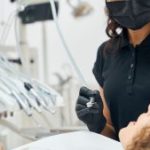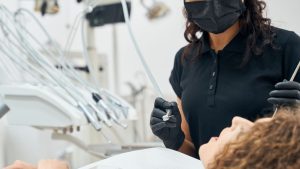





The National Court has ruled that oral health is included within the catalog of benefits of the National Health System and, consequently, workers who go to the dentist and/or dentist have the right to have said appointments included on paid leave to attend medical consultations.
This is how the Social Chamber ruled after considering the claim regarding collective conflict, presented by the General Confederation of Labor (CGT) against a company in the sector. Contact Center and that affected nearly 5,000 workers of the aforementioned employer.

As a result of this failure, available in the ‘download resolution’ button, The defendant company is ordered to recognize its workers’ right to the aforementioned paid leave to attend dentist-dentist-stomatologist consultations.as well as for the accompaniment of employees, descendants under 18 years of age, ascendants over 75 years of age and dependents dependent on the worker.
The facts
In the present case prosecuted, the convicted company, Covisian España SL, has as its corporate purpose the telemarketing activity carried out through the telephone network or any other telematic means. It has an approximate workforce of 5,000 employees in its work centers in different Spanish cities. Likewise, the company is within the scope of application of the III Collective Agreement at the state level of the transportation sector. Contact Center (formerly telemarketing).

Among the paid permits included in article 30.2 III of the aforementioned Collective Agreement to which the company is subject, is the so-called right of 35 annual medical hours, by virtue of which staff were granted the right to use up to 35 paid hours per year to attend doctor’s consultations of Social Security.
In 2015, the CGT Union Section sent an email to the Human Resources department transferring the query of a worker who had gone to the dentist and whose absence had been recognized as justified but unpaid. The company’s response was: “Indeed, it was erroneous information, the absence is justified and compensated and will be stated as such.” Likewise, during 2021, different workers sent the company emails providing proof of attendance at the dentist.
However, In this year, 2024, the company began to deny employees the possibility that oral health was within the right to remuneration of said leave.alleging that the expression “medical consultations” refers only to doctors or medical graduates, including dentists, but not dentists or odontologists.
This business practice—consisting of denying workers paid leave of up to 35 annual medical hours, in cases of attendance at dentist-stomatologist, Social Security and/or private doctor consultations, as well as for accompaniment from working people to descendants under 18 years of age, to ascendants over 75 years of age and to dependents dependent on the worker—led to The General Confederation of Labor filed a lawsuit regarding a collective conflict against the companyrequesting in the aforementioned lawsuit that workers’ right to paid leave be recognized through judicial means when they attend consultations related to oral health.


(Image: E&J)
The company’s practice is contrary to law
The National Court has upheld the claim and declared the right of the company’s workers to paid leave of up to 35 annual medical hours for workers to attend dentist-dentist-stomatologist, Social Security and/or consultations. as a private doctor, as well as for the accompaniment of workers to descendants under 18 years of age, ascendants over sixty-five years of age and dependents dependent on the employee.
Likewise, the Social Court has condemned the defendant company to cease the practice of denying workers said paid leave in the circumstances described above.
The ruling states that Oral health care is included in the catalog of benefits of the National Health System and the Common Portfolio of the National Health System and, in accordance with Royal Decree 1030/2006, of September 15, which establishes the portfolio of common services of the National Health System and the procedure for its updating, the services and medical treatments that include oral care. And this includes both the specialty of stomatology and dentistry.
“And it is at this point that the evolution of social reality must be taken into account as an interpretative criterion not only of the rules, but also of the agreements or business pacts that improve conventional regulations,” states the National Court, “this is, If a certain oral treatment can be performed by both a stomatologist (certification to be extinguished) and a dentistthe consequences of the aforementioned treatment being identical It is not understood why a formal interpretation of the aforementioned agreements must be introduced to exclude dental treatment in relation to the enjoyment of the permit. paid 35 hours per year.”
Besides, This conclusion is supported by the company’s own activity in the past.since it is clear that the dentist’s certificate was considered sufficient for the purposes of recognition of the paid leave on at least one occasion in 2015, there being subsequent requests that do not appear to have been questioned by the company at the time.


(Image: E&J)
Oral health is integrated into paid leave
The National Court points out that, although currently the professions of doctor and dentist have access regulations and differentiated teaching contents, there is the possibility that oral health medical treatments are provided by stomatologists under the same terms and conditions as the dentists.
And, this being so, “and the company does not question whether the permission is appropriate in case of assistance to a stomatologist”, There is no room for a restrictive interpretation that limits the right of workers to enjoy leave. paid 35 hours per year when they go to dentist-dentist-stomatologist consultationsas well as for the accompaniment of working people, descendants under 18 years of age, ascendants over 75 years of age and dependent dependents.
“The social reality of the time in which the rule must be applied and the ultimate purpose of the recognized permit (which includes the accompaniment of minors, parents over 75 years of age and other dependent persons) impose such a conclusion,” the Court rules. of the Social.
